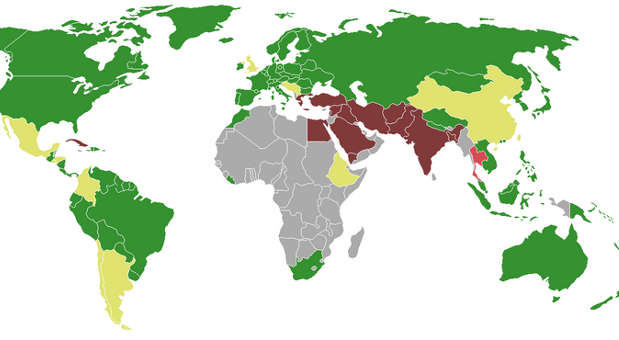Israel: A Different Reason to Be Thankful
This week marks a special milestone and anniversary in the history of modern Israel and Israel’s rebirth as the nation-state of the Jewish people in the Land of Israel. On November 29, 1947, the United Nations approved resolution 181, laying the foundation for the State of Israel to be born six months later.
The Jewish people met this milestone with festive celebration and an overwhelming affirmation. The Arab and Islamic world responded with hostility, a resounding rejection, and a war that’s not ended since. (The full text of the resolution can be found here.
After considerable debate, the United Nations voted to partition the remaining portion of British Mandatory Palestine into Jewish and Arab states. The plan was supported by the Soviet Union and its Eastern European satellite governments, hoping that the new Jewish state would be a safeguard against British imperialism. Due to the support of President Harry S. Truman, and despite State Department advice and Department of Defense pressure otherwise, the United States likewise supported the partition plan, and ensured its passage.
Today, throughout Israel, it’s common to find streets and other public areas named “November 29” in honor of this milestone. But the U.N. vote did not take place a whim or an event in itself, but the conclusion of a series of events moving in this direction over the previous decades. Some of these include:
- May 1916 – The Sykes-Picot Agreement, where British and French divided up the Arab provinces of the Ottoman Empire asserting their respective control and influence post WWI, and borders that are still evident and artificial today.
- November 1917 – The Balfour Declaration affirmed British support for a Jewish state, noting “His Majesty’s Government view with favor the establishment in Palestine of a national home for the Jewish people, and will use their best endeavous to facilitate the achievement of this object, it being clearly understood that nothing shall be done which may prejudice the civil and religious rights of existing non-Jewish communities in Palestine, or the rights and political status enjoyed by Jews in any other country.”
- April 1920 – The San Remo Conference provided the foundation for mandates over Syria, Lebanon, Iraq and Palestine, and included in it the Balfour Declaration as part of the responsibility of the British mandate.
- June 1922 – The British White Paper affirming the Balfour Declaration, but partitioning the area of the mandate by excluding the area east of the Jordan River (the east bank) from Jewish settlement. A total of 76 percent of the original Palestine Mandate land was renamed Transjordan and was given to the Emir Abdullah.
- July 1922 – The League of Nations established the British Mandate over all of Palestine, based on the San Remo conference, affirming in the process the 1917 Balfour Declaration and the British mandate to implement this plan.
Over the following two and a half decades, Jewish immigration and return to Israel continued, but was limited by the British just as the Nazi killing machine was getting up to the capacity that would see 6 million murdered. The Land flourished and prospered, and Arabs from nearby countries also migrated in order to share in the prosperity. There were many cases of Jews and Arabs living together and getting along quite well, but these were overshadowed by the threats and actual violence against Jewish communities as the years went on and Israel’s independence drew closer.
The Jews of Palestine, then known as the Palestinians (a term that’s been adopted since the 1960s to refer to Arabs in Israel), celebrated. The Arab league rejected the partition plan, and fighting against the fetal Jewish state and Jewish communities erupted throughout the Land.
In 1949, formal fighting ended, but the war never did. The armistice line identifying the positions at the end of fighting became known as the Green Line, with Jordan and Egypt occupying land designated for an Arab state. No borders have ever been defined since because the state of war still exists.
It may be hard to imagine for gentiles, but the weight of 2000 years of history exploded that day in unbridled emotion. I imagine my father as a 10-year-old amid all the celebrations. I get choked up just thinking about it. Some of the history and festivity as related by people who lived through it are well documented in this video.
As much as the UN Partition resolution and many other milestones were significant, what’s certain is that it’s not the UN that gives Israel legitimacy. Israel’s legitimacy comes from the God of Abraham, Isaac, and Jacob, in a covenant and promise He made, has not broken, and never will. It’s impossible not to see the hand of God in the events leading up to Israel’s renewal and birth, and the miraculous victories over Israel’s enemies in 1948-49, 1967, 1973, and still today.
And because Israel’s rebirth is the fulfillment of God’s promise, it’s not a coincidence that the last three countries to decide to vote that November 29 to establish Israel as the Jewish state have seen the fulfillment of the promise of Genesis 12:3. In recent years, Liberia, Haiti, and the Philippines have been plagued by disease and natural disasters impacting millions. But it is Israel that has sent help and aid to their countries and it is Israel whose commitment and know how has helped—and is still helping—to save those in need.
This week, Americans celebrate Thanksgiving. In Israel, we have another reason to be thankful.
Jonathan Feldstein was born and educated in the U.S. and immigrated to Israel in 2004. He is married and the father of six. Throughout his life and career, he has been blessed by the calling to fellowship with Christian supporters of Israel and shares experiences of living as an Orthodox Jew in Israel. He writes a regular column for Charisma magazine’s Standing With Israel. You can contact Jonathan at [email protected].
















































